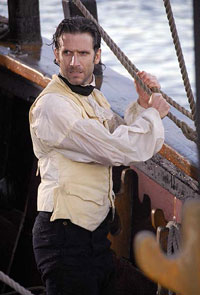Freedom
Rated M
Stories abound of the historical mistreatment of slaves in the American South – the violence of owners, the abuse of slave women and the abiding faith of so many in bondage, who looked toward a heavenly home as their comfort amid earthly hardships.
Freedom does draw on such history, but highlights an element well worth celebrating: the Underground Railroad. This was a network of men and women who helped escaping slaves to freedom in the northern US states – and, after a change in the law made these states no longer a sanctuary, they took escapees further north into Canada.
The Underground Railroad was overwhelmingly comprised of people of faith, who saw slaves as fellow human beings under God, rather than as property or sub-human. Lives were risked and sometimes lost, and up to 100,000 people rescued over the many decades the Railroad operated.
Freedom follows the difficult journey to Canada of one family – fictional, yet touching on elements of many real-life stories. The family is led by Samuel (Cuba Gooding, Jr) who, together with his wife, son and grandmother, flees a Virginia plantation in 1856. The family then places itself in the hands of renowned Quaker leader Thomas Garrett (Michael Goodwin) on the first leg of what proves to be a long and tricky escape.
 The filmmakers could have used many specific slave stories here, but Samuel’s family story has been put together to blend it with the true tale of pastor and hymn writer John Newton, through a link made with Newton’s slave trading career a century earlier.
The filmmakers could have used many specific slave stories here, but Samuel’s family story has been put together to blend it with the true tale of pastor and hymn writer John Newton, through a link made with Newton’s slave trading career a century earlier.
So on the one hand we have an African American family of faith (with the exception of the embittered Samuel), who are seeking to be as free in body as they are in mind. On the other we have, in John Newton (Bernhard Forcher), an ambitious young man who has little time for God until circumstances force him to his knees.
So this is, in every way, a Christian film. And that may ring alarm bells for some, who will assume that the performances, script or production values must somehow be wanting, in order for the makers to knock people about the head with the gospel – much as one wields a blunt instrument.
But there are no short cuts by the filmmakers here: it’s a well-made film with strong performances. So perhaps the simple fact of dealing with a “Christian” film is the most problematic? Or perhaps we are having a moment of cultural cringe because it’s an American Christian film (although the director is Australian music theatre stalwart Peter Cousens)?
While we deal with our discomfort – for whatever reason – consider that church was central to life for just about everyone in this era, steeped as they were from the cradle to the grave in the words of the Bible and the songs of faith. These words come naturally to the likes of Samuel’s grandmother Adina (Phyllis Bash) and to Garrett, and we might feel slightly awkward about this, but it’s worth considering whether this says more about us and our worldliness than anything else.
I’d certainly say some of the characters in Freedom are one-dimensional, and most of these are slave owners or plantation staff. They are creatures of their day, for whom the idea of conscience or doubts over slavery would have been almost incomprehensible. Those who are gentler are, like one plantation owner, mocked for their “Christian charity”.
It’s not all one-way traffic, but adding layers to certain story elements would have given the film more depth. The ending is a little forced, for example, and Newton’s conversion experience and change have been condensed and tweaked to dovetail with Samuel’s family. But historically slaves did trust in their Lord, Newton was brought to faith while a slave trader, and the same grace was and is available to anyone – slaves and masters, rescuers and pursuers, gentle and violent – which is a pretty good thing to share.
Cousens’ love of music is all over this film, and it presents almost as a theatrical musical. Quakers like Garrett didn’t sing, but most other people did, and the film is filled with song – from a travelling troupe of actors (including Aussie Tony Sheldon) to southern Christians in a horse and cart, to the soaring voice of the translator on Newton’s slave ship. If you don’t like music this might bother you, but I loved it – particularly the fearless theatre group and slave translator Ozias (Jubilant Sykes).
Freedom reminds us that our own freedom does not lie in where or how we are born, what we own or how we have lived. It has been bought and it is given freely to us – and others. Passing on this tale of the past is so that people can learn, grow and be moved about slavery, faith and the promises of God.
And before we finish the film by feeling warm and fuzzy about salvation and the Christian strength of those who have gone before, the closing moments remind us that more people live in slavery now than at any other time in history.
So it’s not just about them, and then.
It’s about us, and now.
Feature photo: Facing the future: Samuel Woodward (Cuba Gooding, Jr, second from right) flees slavery with his family, helped by Quaker hero Thomas Garrett (Michael Goodwin)





























